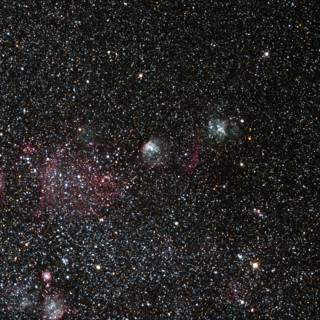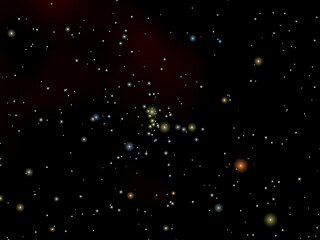
NGC 47 is a barred spiral galaxy in the constellation Cetus, discovered in 1886 by Ernst Wilhelm Leberecht Tempel. Its alternate name NGC 58 is due to the observation by Lewis Swift, who was unaware that Tempel had already discovered the celestial object earlier. It appears as a small, faint spiral nebula with a bright core and is slightly oval.

NGC 2359 is an emission nebula in the constellation Canis Major. The nebula is approximately 3,670 parsecs away and 30 light-years in size. The central star is the Wolf-Rayet star WR7, an extremely hot star thought to be in a brief pre-supernova stage of evolution. It is similar in nature to the Bubble Nebula, but interactions with a nearby large molecular cloud are thought to have contributed to the more complex shape and curved bow-shock structure of Thor's Helmet.

NGC 51 is a lenticular galaxy in the constellation Andromeda. It has a diameter of 90,000 light-years. The galaxy was discovered on September 7, 1885 by Lewis Swift, who described it as "Pretty faint, pretty small, round, brighter middle."

NGC 169 is a barred spiral galaxy located in the constellation Andromeda. It was discovered on September 18, 1857 by R. J. Mitchell.

NGC 233 is an elliptical galaxy located in the constellation Andromeda. It was discovered on September 11, 1784 by William Herschel.

NGC 237 is a spiral galaxy located in the constellation Cetus. It was discovered on September 27, 1867 by Truman Safford.

NGC 260 is a spiral galaxy located in the constellation Andromeda. It was discovered on August 27, 1865 by Heinrich d'Arrest.

NGC 261 is a diffuse nebula located in the constellation Tucana. It was discovered on September 5, 1826 by James Dunlop.

NGC 273 is an edge-on lenticular galaxy in the constellation Cetus. It was discovered on September 10, 1785 by William Herschel.

NGC 274 is a lenticular galaxy in the constellation Cetus. It is a pair of galaxies, the other being NGC 275, which it is currently interacting with. It was discovered on September 10, 1785 by William Herschel. It is roughly 120 million light-years away.

NGC 293 is a barred spiral galaxy in the constellation Cetus. It was discovered on September 27, 1864 by Albert Marth.

NGC 298 is a spiral galaxy in the constellation Cetus. It was discovered on September 27, 1864 by Albert Marth. NGC 298 is situated close to the celestial equator and, as such, it is at least partly visible from both hemispheres in certain times of the year. Given its B magnitude of 14.7, NGC 298 is visible with the help of a telescope having an aperture of 20 inches or more.

NGC 304 is a lenticular galaxy in the constellation Andromeda. It was discovered on October 23, 1878, by Édouard Stephan.

NGC 315 is an elliptical galaxy in the constellation Pisces. It was discovered on September 11, 1784 by William Herschel.

NGC 327 is a spiral galaxy in the constellation Cetus. Also known as "The Jamie Smith Star" (ISD0534203) and was discovered on September 27, 1864 by Albert Marth. It is described by Dreyer as "faint, small, extended." It is nearby galaxies NGC 329, NGC 325 and NGC 321.

NGC 375 is an elliptical galaxy located in the constellation Pisces. It was discovered on September 12, 1784 by William Herschel. It was described by Dreyer as "pretty faint, small, round, brighter middle." Along with galaxies NGC 379, NGC 380, NGC 382, NGC 383, NGC 384, NGC 385, NGC 386, NGC 387 and NGC 388, NGC 375 forms a galaxy cluster called Arp 331.

NGC 380 is an elliptical galaxy located in the constellation Pisces. It was discovered on September 12, 1784 by William Herschel. It was described by Dreyer as "pretty faint, small, round, suddenly brighter middle." Along with galaxies NGC 375, NGC 379, NGC 382, NGC 383, NGC 384, NGC 385, NGC 386, NGC 387 and NGC 388, NGC 380 forms a galaxy cluster called Arp 331.

NGC 7160 is an open cluster in the constellation Cepheus. It was discovered by William Herschel on November 9, 1789. The cluster was also observed by John Herschel on October 7, 1829. It is a poor cluster and with little central concentration, with Trumpler class II3p. It is part of the stellar association Cepheus OB2, located one degree south-southwest of VV Cephei.

NGC 6910 is an open cluster in the constellation Cygnus. It was discovered by William Herschel on October 17, 1786. The cluster was also observed by John Herschel on September 18, 1828. It is a poor cluster with prominent central concentration and Trumpler class I2p. NGC 6910 is the core cluster of the stellar association Cygnus OB9.

NGC 690 is an intermediate spiral galaxy located in the constellation Cetus about 236 million light-years from the Milky Way. It was discovered by the American astronomer Francis Leavenworth in 1885.




















